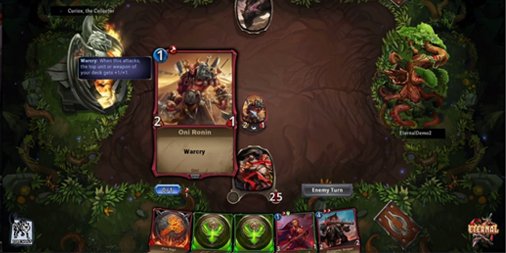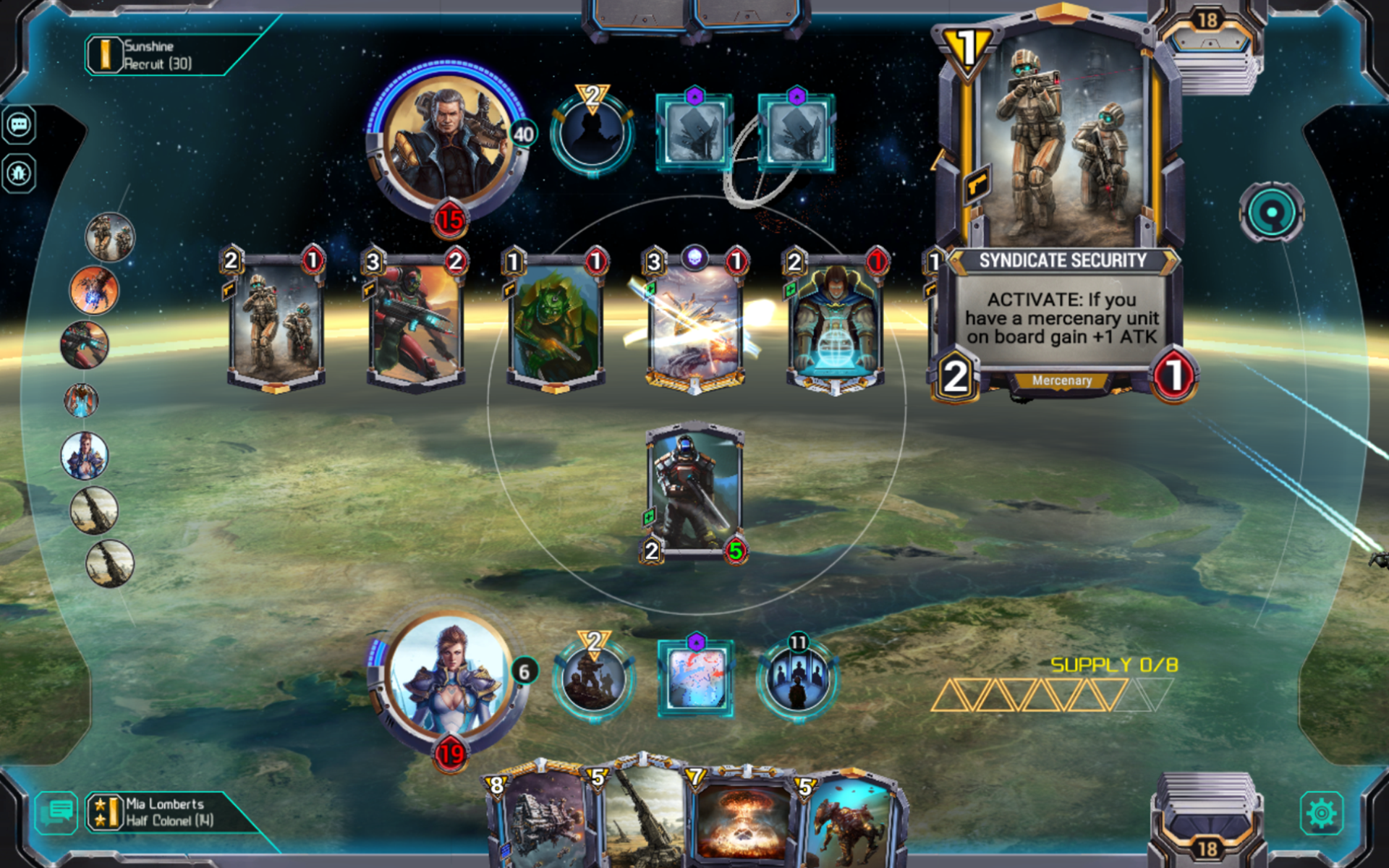Thanks to poor timing involving Shadows Over Innistrad’s release and Pro Tour, Wizards was unable to attend PAX East this year. So I got a chance to try out a ton of new card games, some on paper but most in digital form. This week and next we’ll be taking a look at a wide variety of card games, their competitive scenes, and whether or not there’s anything interesting there for the Magic community.
Card Games at PAX East Part I
Bring in the Clones
This week we’re going to talk a bit about Magic’s top competition: Hearthstone. We’re not actually going to talk about the game of Hearthstone though, since there’s plenty of places to learn about Hearthstone. Instead I want to talk about clones of Hearthstone, which have become quite prevalent in the world of digital card games.
Hearthstone is exceptionally successful, like Magic. As such there are plenty of clones who are vying to become the “next big thing” in the world of card games. While I was at PAX East I was able to check out four games which are, at their core, built on the basic premise of Hearthstone or Magic, but have some modification to make them more unique.
Elder Scrolls Legends (Dire Wolf/Bethesda)

Our journey begins with the latest Elder Scrolls title. You may remember this series for its massive, open-world RPG’s: Morrowind, Oblivion, and most recently Skyrim. Now Bethesda and developer Dire Wolf Digital are bringing the world of Tamriel into the arena of digital collectible card games.
Official Site: legends.bethesda.net
Twitter: @TESLegends
Facebook: TESLegends
Reddit: /r/elderscrollslegends
Status: Closed Beta
I was able to demo TES Legends at PAX East and it plays a lot like Hearthstone with a few interesting mechanical differences. First, and most apparent, is that the board is split in half into lanes. Minions in one lane can only attack/target minions in their lane. Some effects allow minions to switch lanes, or impact the other lane. This certainly adds a bit of complexity to the basic Hearthstone core mechanics. The second noticeable difference was drawing a card when you lose a certain amount of life. I suspect this is designed to try to facilitate come-from-behind games.
TES Legends looks gorgeous. There’s no denying that like Skyrim and its predecessors, this installment in the Elder Scrolls saga will be visually stunning. Will the game-play match? It’s a difficult market to break into, but Bethesda has the benefit of an established world, an already devoted fan-base, and visual appeal.
We don’t yet know much more about Legends’ eSports scene potential as there has been very little talk of competitive play, but the game is still in the early stages. Ranked play is almost certainly going to exist but there haven’t been many details.
Eternal Card Game (Dire Wolf)

Magic fans may already be very aware of Eternal thanks to the inclusion of several high-profile Magic players on the design team: namely Luis Scott-Vargas and Patrick Chapin (among others).
Official Site: eternalcardgame.com
Twitter: @eternalcardgame
Facebook: eternalcardgame
Reddit: /r/eternalcardgame
Status: Closed Beta
Eternal is, simply put, Hearthstone meets Magic. The gameplay at its core is very much Hearthstone, but a lot of concepts are taken from Magic, including two which are critical to Eternal’s uniqueness. The first is the resource system which uses a combination of power (total max casting cost per turn) and influence. Influence is a bit trickier to understand but this entire system works almost identically to Magic’s lands.
The second concept that Eternal introduces is “fast effects” which are cards you can play or actions you can take on your opponent’s turn (such as block). This adds a level of complexity and strategy to the game which does not exist in Hearthstone. These mechanics should feel intuitive to Magic players but may feel clunky to Hearthstone players.
Eternal is still in closed beta but I played the demo match at PAX East. Similar to Elder Scrolls: Legends, Eternal plays out very much like Hearthstone. The elegant interface and speed of play would seem to lend itself to the eSports world that Hearthstone is currently the king of. The Eternal team made it clear that competitive play is something very important to them.
If you’re looking for a game with the accessibility of Hearthstone but the complexity of Magic, this might be the game for you.
Star Crusade (ZiMad)
It would be easy to describe Star Crusade as Hearthstone in Space and you wouldn’t be too far off. Star Crusade does have a small but devoted following as the game is in open beta (download it on Steam).
Official Site: Steam Powered
Twitter: @star_crusade
Facebook: StarCrusade
Reddit: /r/starcrusade
Status: Open Beta
Star Crusade was on demo at PAX East but since it’s in open beta you can try it out for yourself. Mechanically it is very similar to Hearthstone, but again with a few changes to increase the game’s strategic and deck-building complexity. The main change is the ability to have multiple powers at your disposal (at the cost of other resources).
While the community for Star Crusade is the smallest among these games, there is a lot of support planned for competitive play. It will be interesting to see if they’re able to create their own niche in the digital CCG community with so much competition building up. Without the strength of a dedicated intellectual property (like Warcraft or Skyrim), or the backing of big-name designers (like LSV and Chapin), Star Crusade has a bit of an uphill battle, but it’s also the only one of these three games you can go download right now.
Hex TCG (Cryptozoic)

Our last clone for the day is Hex, which as you may know is not a clone of Hearthstone but a clone of Magic: the Gathering. Hex was famously sued by Wizards of the Coast for trade dress infringement and the case was settled out of court. Now, Hex has been fully live for some time and just released a new expansion.
Official Site: hextcg.com
Twitter: @HexTCG
Facebook: HexTCG
Reddit: /r/hextcg
Status: Live
Hex is a digital version of Magic: the Gathering wrapped inside of an MMORPG-type game. You, the adventurer, battle opponents by playing games of Hex. You can collect cards which can only be used in single-player (PvE) mode and other cards which can only be used when playing against other players (PvP).
Since Hex is based on Magic it has all of the competitive offerings of Magic including constructed and limited varieties. Hex’s inaugural invitational championship paid out $100,000 including a $40,000 first-prize. There’s clearly a lot of support for competition here and you can check out more details at https://www.hextcg.com/game/tournaments/.
Hex may always suffer from the fact that it’s just Magic: the Gathering but one has to wonder if there’s a place in the eSports/CCG world for a better-managed version of Magic. Hex likely won’t be better designed than Magic, not without luring some designers away, but the competitive support and other aspects of the game could easily surpass an unsuspecting Wizards of the Coast.
All four of these games bring something new to the table despite, at their core, being clones of two of the most successful collectible card games of all time. The question that remains to be answered is whether any of them can separate from the pack and carve out their own space in the wider gaming community.
Regardless of the answer to that question, it’s a good time for the growth of the card game community and it will be interesting to see where it goes in the next few years.
Next week we’ll wrap up our survey of PAX East with a look at two completely different digital card games and a handful of competitive card games that are still played with physical cardboard.
What We Learned is a weekly feature here at Hipsters of the Coast written by former amateur Magic Player Rich Stein, who came really close to making day two of a Grand Prix on several occasions. Each week we will take a look at the past seven days of major events, big news items, and community happenings so that you can keep up-to-date on all the latest and greatest Magic: the Gathering community news.


